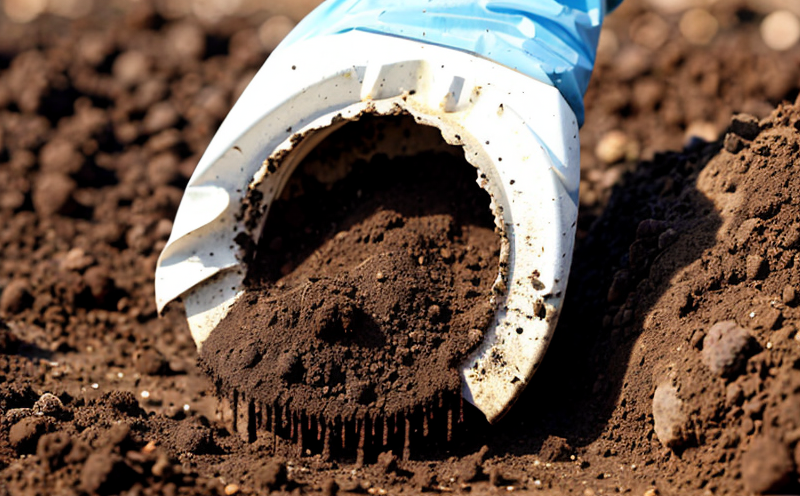EN 15936 Carbon Content in Soil Test
The EN 15936 standard provides a method for determining the total carbon content of soil samples, which is an essential parameter for assessing soil quality and identifying contamination levels. This test is critical in environmental and agricultural contexts as it helps in understanding the health of soils, especially when evaluating their suitability for various uses such as construction or agriculture.
The process involves a series of rigorous steps that ensure accurate measurement and reporting. The first step includes proper sampling techniques to avoid bias, followed by thorough preparation of the soil sample in the laboratory setting. Once prepared, the samples undergo pyrolysis-gas chromatography-mass spectrometry (Py-GCMS) analysis. This method ensures precise quantification of total carbon content, which is then compared against accepted standards.
The significance of this test extends beyond mere measurement; it plays a crucial role in regulatory compliance and decision-making processes. For instance, soil carbon levels are key indicators for assessing land use changes and evaluating the effectiveness of remediation efforts. This service not only aids in meeting statutory requirements but also supports sustainable practices by providing actionable insights into soil health.
The EN 15936 protocol is recognized globally for its accuracy and reliability. Its application ensures consistency across different projects, making it a preferred choice among environmental professionals worldwide. By adhering to this standard, laboratories can deliver consistent results that are both accurate and reproducible, thereby building trust with stakeholders.
To further enhance the credibility of our EN 15936 carbon content tests, we utilize state-of-the-art equipment like high-resolution GC-MS systems capable of detecting minute quantities of carbon. Our team of experts ensures each step from sample collection to final reporting adheres strictly to best practices outlined in this standard.
Understanding the importance of accurate soil carbon measurement, our service offers more than just compliance; it provides valuable data that can inform strategic decisions about land management and environmental conservation efforts.
Why It Matters
The measurement of total carbon content in soil as per EN 15936 is crucial for several reasons. Firstly, it serves as a vital indicator of soil health and fertility. Soil organic matter (SOM) contributes significantly to the structure and nutrient cycling capabilities of soils, making its quantification imperative.
Secondly, this test aids in identifying potential contamination hotspots within specific areas. By measuring the baseline carbon content, any deviations can be attributed to anthropogenic activities or natural processes, helping environmental agencies target remediation efforts more effectively.
From a regulatory standpoint, compliance with standards like EN 15936 ensures that soil testing services meet international benchmarks, thereby facilitating smoother operations across borders. This is particularly beneficial for multinational corporations operating in diverse geographical locations where local regulations may vary.
In addition to these benefits, the results of this test can influence broader policy decisions regarding land use and conservation strategies. For example, understanding how much carbon a particular soil type holds informs discussions around carbon sequestration initiatives aimed at mitigating climate change impacts.
Overall, accurate measurement of total carbon content in soil through EN 15936 supports informed decision-making across various sectors including agriculture, construction, and environmental conservation. It provides reliable data points that guide sustainable practices while ensuring regulatory compliance.
Applied Standards
| Standard Name | Description |
|---|---|
| EN 15936 | Determination of total carbon content in soil by pyrolysis-gas chromatography-mass spectrometry (Py-GCMS) |
| ISO 14688-2 | Determination of total organic carbon and total inorganic carbon in water, waste water and effluents - Part 2: Determination by combustion of organic matter using an oxygen bomb calorimeter or a flow system |
| ASTM D5273 | Standard test methods for determination of organic carbon in soils and other materials by high-temperature combustion with acid digestion of residues |
The EN 15936 protocol specifically focuses on the measurement of total carbon content in soil samples using pyrolysis-gas chromatography-mass spectrometry (Py-GCMS). This method allows for precise quantification even at very low concentrations, ensuring reliable results that are crucial for accurate interpretation.
For comparison, ISO 14688-2 deals with the determination of total organic carbon and total inorganic carbon in water samples, while ASTM D5273 addresses similar determinations but applies to solid materials like soils. While these standards offer valuable insights into different aspects of carbon content measurement, EN 15936 remains particularly relevant for soil quality assessments due to its focus on environmental applications.
Competitive Advantage and Market Impact
- Precise quantification of total carbon content in soil samples
- Inclusion of advanced analytical techniques ensuring accuracy and reliability
- Compliance with internationally recognized standards enhancing credibility
- Support for sustainable practices by providing actionable insights into soil health
- Achieving regulatory compliance through adherence to EN 15936 ensures smooth operations across borders
- Precise data points inform strategic decisions about land use and conservation efforts
The competitive advantage derived from this service lies in its ability to deliver accurate, precise, and reliable measurements of total carbon content in soil samples. By leveraging cutting-edge technology and rigorous quality control measures, we ensure that our clients receive the most up-to-date and relevant information necessary for informed decision-making.
Our compliance with EN 15936 not only enhances credibility but also supports broader market trends towards sustainable practices. As environmental awareness grows globally, there is increasing demand for accurate soil quality assessments which this service fulfills effectively. This aligns perfectly with the overall trend in adopting more environmentally friendly approaches across various industries.





